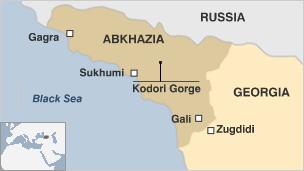Abkhazia profile - Overview
- Published

Abkhazia declared independence from Georgia in 1999. Georgia regards it as a separatist region "occupied" by Russia.
Situated in the north-western corner of Georgia with the Black Sea to the south-west and the Caucasus mountains and Russia to the north-east, Abkhazia was once known as a prime holiday destination for the Soviet elite.
Abkhazia's battle for independence from Georgia since the collapse of the USSR reduced the economy to ruins. More recent times have seen major Russian investment in the territory, as Moscow seeks to consolidate its influence.
Abkhazia's long history was always closely intertwined with that of Georgia, although the Abkhaz language is unrelated and is closer to several spoken in the North Caucasus.
From the 9th century BC onwards, it was part of the Georgian-dominated kingdom of Colchis. The area adopted Christianity in the sixth century.
In the 8th century AD, Abkhazia became an independent state, before being united with the medieval kingdom of Georgia in 1008. In the 19th century, the wider region came under Russian domination, and in 1864 Abkhazia was annexed to the Russian Empire.
Limited autonomy
After the Bolshevik revolution, Abkhazia gained a measure of autonomy, before Stalin incorporated it into the Soviet union republic of Georgia in 1931.
Despite formally remaining an autonomous republic within Soviet Georgia, there was very little sign of genuine autonomy, and Abkhaz ethnic culture was suppressed in favour of Georgian. The policy of repression was eased soon after Stalin's death in 1953.
At the time of the collapse of the USSR in 1991, less than a fifth of the people of Abkhazia were ethnic Abkhaz, while the rest of the population was made up largely of Georgians.
When Georgia became independent, supporters of a break with Georgia in favour of independence and closer ties with Russia became more vociferous. Tension grew, and in 1992 Georgia sent troops to enforce the status quo.
In late 1993, they were driven out in fierce fighting. Several thousand people were killed, and nearly the entire Georgian-speaking population fled the republic in what Georgia describes as a campaign of ethnic cleansing.
Declaration of independence
Abkhazia formally declared independence in 1999, resulting in an international economic embargo that is still in force. It has left Abkhazia's economy highly dependent on Russia, which maintains a border crossing and railway line to Sukhumi.
Moscow infuriated Georgia by making it easy for people in Abkhazia to gain Russian citizenship, and most now hold Russian passports.
For nearly 15 years, UN peacekeepers - mainly composed of Russians - patrolled a buffer zone on the border between the two sides.
However, in August 2008, during the war between Russia and Georgia over South Ossetia, Russian army troops moved through Abkhazia and pushed into Georgia proper, effectively using the region to open another front with Georgia.
Meanwhile, Abkhaz forces drove Georgian troops out of the only area of Abkhazia still under Georgian control - the Kodori gorge.
After the 2008 conflict, Moscow declared that it would formally recognise the independence of both South Ossetia and Abkhazia. Russia's allies Nicaragua and Venezuela followed suit, as did the Pacific microstate of Nauru.
Russia controls frontier
In October 2008, Russia pulled its troops back to the Abkhaz-Georgian border, but stationed a large force in the breakaway republic, with the agreement of the Abkhaz government.
The next year, Moscow also vetoed an extension of the UN peacekeeping mission, and signed a five-year agreement with Abkhazia to take formal control of its frontiers with Georgia proper.
Since Abkhazia's "independence" was recognized by Russia, it has grown more and more dependent on Russia. In 2014, Russia and the breakaway Georgian region signed a "strategic partnership" agreement, angering Tbilisi, which accused Moscow of seeking to annex Abkhazia.
Abkhaz militia seized control of the Kodori gorge from Georgian forces in 2008